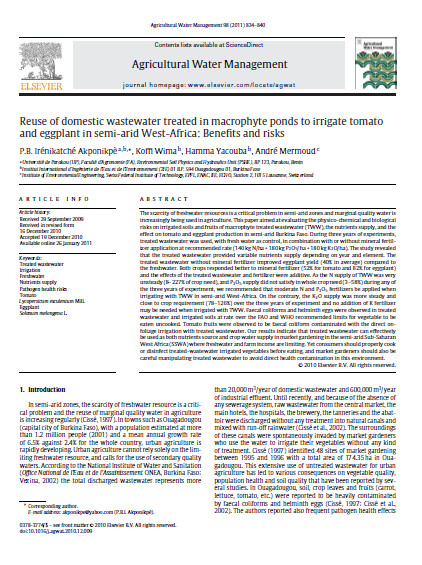Reuse of domestic wastewater treated in macrophyte ponds to irrigate tomato and eggplant in semi-arid West-Africa: Benefits and risks
 |
article Sep 2009 ; 8 pages
Aut. Irénikatché Akponikpe & André Mermoud & Koffi Wima
Ed. EPFL - Lausanne 2iE - Ouagadougou Université de Parakou - Parakou
Téléchargeable sous format: PdF
Téléchargeable chez l'éditeur
Abstract:
This paper aimed at evaluating the physico-chemical and biological risks on irrigated soils and fruits of macrophyte treated wastewater (TWW), the nutrients supply, and the effect on tomato and eggplant production in semi-arid Burkina Faso. During three years of experiments, treated wastewater was used, with fresh water as control, in combination with or without mineral fertilizer application at recommended rate (140 kg N/ha + 180 kg P2O5/ha + 180 kg K2O/ha). The study revealed that the treated wastewater provided variable nutrients supply depending on year and element. The treated wastewater without mineral fertilizer improved eggplant yield (40% in average) over the two years compared to the freshwater. Both crops responded better to mineral fertilizer (52% for tomato and 82% for eggplant) and the effects of the treated wastewater and fertilizer were additive.
Faecal coliforms and helminth eggs were observed in treated wastewater and irrigated soils at rate over the FAO and WHO recommended limits for vegetable to be eaten uncooked. Tomato fruits were observed to be faecal coliform contaminated with the direct on-foliage irrigation with treated wastewater. Our results indicate that treated wastewater can effectively be used as both nutrients source and crop water supply in market gardening in the semi-arid Sub-Saharan West Africa (SSWA) where freshwater and farm income are limiting. Yet consumers should properly cook or disinfect treated-wastewater irrigated vegetables before eating, and market gardeners should also be careful manipulating treated wastewater to avoid direct health contamination in this environment.
Mots clefs: |
boues (traitement des ) (CI) (DT) (OP) (ope) , eaux usées (réutilisation) (CI) (DT) (OP) (ope) , eaux usées (traitement des ) (CI) (DT) (OP) (ope) , irrigation (CI) (DT) (OP) (ope) , jardins (CI) (DT) (OP) (ope) |
Pays concerné: |
Editeurs/Diffuseurs: |
|
EPFL
-
Ecole polytechnique fédérale de Lausanne - Lausanne - Suisse |
2iE
-
Institut International d'Ingénierie de l'Eau et de l'Environnement - Ouagadougou - Burkina Faso |
Université de Parakou - Parakou - Bénin |
En cas de lien brisé, nous le mentionner à communication@pseau.org